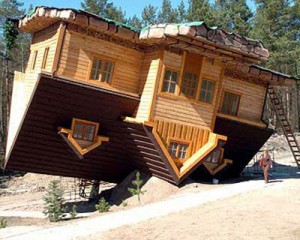 No, it doesn’t literally mean that you’re upside-down. It’s a financial term that describes the relationship between the value of your home and what you still owe on your home mortgage.
No, it doesn’t literally mean that you’re upside-down. It’s a financial term that describes the relationship between the value of your home and what you still owe on your home mortgage.
When you borrow money, you usually have to have something to secure that money against, so the bank has a way to recover their money if you don’t pay your payments on time. Usually, it’s the item you’re purchasing.
When the bank loans you money on a house, they do so based on the current value of the house, with the assumption that you will pay back the loan in full, over time, regardless of the value of the home at the time you sell it.
Sometimes your home appreciates (increases) in value, and sometimes, such as in recent years, your house depreciates (decreases) in value.
If your home’s value is less than what you owe the bank, then it is said that you are “upside-down.” There are only a few remedies for this situation, and they depend upon your future plans, and your current financial circumstances.
It’s okay to be upside-down in your home if you plan on staying there long enough to ride out the ups and downs of real estate values. Don’t panic if your home is worth less than you owe. If you can afford your payments and you have a relatively secure job, you can stay.
But, if you are in a financial situation where your income has decreased, your payments have increased, or any other circumstance has caused undue stress on the wallet, it may be time to take a look at your housing options, and perhaps find a less expensive place to live.
If you’re upside-down and you are faced with this situation where you must sell to make the right changes in your life, you are considered a short-sale candidate.
Don’t be overwhelmed, there are thousands of people in your position. You are not alone. Selling homes that are upside-down happens every day. I know, I’ve done it, and it’s called a Short Sale.
It is nothing to be ashamed of. I recently spoke with a client who said that she “felt like white trash,” just because she couldn’t afford her mortgage payments any more. This is so far from the truth.
Whether your home is under $100,000 in value, or over 1,000,000.00 in value, if you’re upside-down and you’re facing financial troubles that will eventually lead to you losing the house, then it’s time to put your ducks in a row and hire a Certified Distressed Property Expert to help you prevent this from happening.
Upside-down simply means it’s going to be a bit more challenging, and will take a bit longer than normal to sell your home. It also means that it will most likely cost you nothing out of pocket in the end.
Don’t give up! There is a solution to being upside-down in your home.
[…] has fallen on hard times; specifically that they owe more on the house than it will sell for (see the article “What Does It Mean to Be Upside Down in Your House”) When the amount you get at sale is less than what is owed, the seller either needs to come to […]